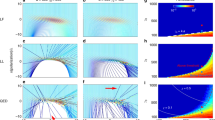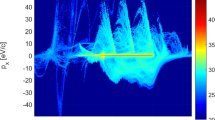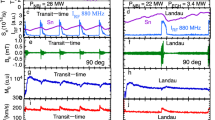Abstract
INTERPRETATION of kinetic-to-internal energy transfers in many-electron heavy particle ionizing collisions1,2 has demonstrated the importance of looking for possible large characteristic energy losses in electron scattering. Previous workers3–5 have studied levels < 100 eV. Most X-ray absorption studies6 do not use continuum sources but characteristic line sources. Heavy particle collision energy losses might arise not from diabatic curve crossing7 but from collective oscillation of electrons8.
This is a preview of subscription content, access via your institution
Access options
Subscribe to this journal
Receive 51 print issues and online access
$199.00 per year
only $3.90 per issue
Buy this article
- Purchase on Springer Link
- Instant access to full article PDF
Prices may be subject to local taxes which are calculated during checkout
Similar content being viewed by others
References
Afrosimov, V. V., Gordeev, Y. S., Panov, M. N., and Fedorenko, N. V., Soviet Phys. Tech. Phys., 9, 1248, 1256, 1265 (1965).
Everhart, E., and Kessel, Q. C., Phys. Rev., 146, 27 (1966).
Geiger, J., Z. Physik., 175, 530 (1963); ibid., 177, 138 (1964): ibid., 181, 413 (1964).
Lassettre, E. N., Berman, A. S., Silverman, S. M., and Krasnow, M. E., J. Chem. Phys., 40, 1232 (1964).
Kuyatt, C. E., and Simpson, J. A., in Atomic Collision Processes (edit. by McDowell, M. R. C.), 191 (N. Holland Pub. Co., 1964).
Lukirskii, A. P., and Zimkina, T. M., Izv. Akad. Nauk SSSR Ser. Fiz., 17, 817 (1963).
Fano, U., and Lichten, W., Phys. Rev. Lett., 14, 627 (1965).
Amusia, M. Y., Phys. Lett., 14, 36 (1965).
Bethe, H. A., Ann. Physik., 5, 325 (1930).
Mott, N. F., and Massey, H. S. W., The Theory of Atomic Collisions, third ed., 475 (Oxford University Press, NY, 1965).
Lassettre, E. N., and Jones, E. A., J. Chem. Phys., 40, 1208 (1964).
Fine, S., and Hendee, C. F., Nucleonics, 13, 36 (1955).
Rudd, M. E., Jorgensen, T., and Volz, D. J., Phys. Rev., 151, 28 (1966).
Slater, J. C., Quantum, Theory of Atomic Structure, 368 (McGraw-Hill, 1960).
Mehlhorn, A. P., thesis, Univ. Karlsruhe.
Lukirskii, A. P., and Zimkina, T. M., Izv. Akad. Nauk SSSR Ser. Fiz., 27, 325 (1963).
Boness, M. J. W., Hale, G. D., Hasted, J. B., and Larkin, I. W., in Abstracts Fifth Intern. Conf. Physics of Electronic and Atomic Collisions, Leningrad, 1967, 577 (Nauk, Leningrad, USSR).
Afrosimov, V. V., Gordeev, Y. S., Lavrov, V. M., and Shchemelinin, S. G., in Abstracts Fifth Intern. Conf. Physics of Electronic and Atomic Collisions, Leningrad, 1967, 127 (Nauk, Leningrad, USSR).
Author information
Authors and Affiliations
Rights and permissions
About this article
Cite this article
HALE, G., HASTED, J. Characteristic Energy Loss of Electrons transmitted through Argon. Nature 217, 945–946 (1968). https://doi.org/10.1038/217945a0
Received:
Revised:
Issue Date:
DOI: https://doi.org/10.1038/217945a0
Comments
By submitting a comment you agree to abide by our Terms and Community Guidelines. If you find something abusive or that does not comply with our terms or guidelines please flag it as inappropriate.



